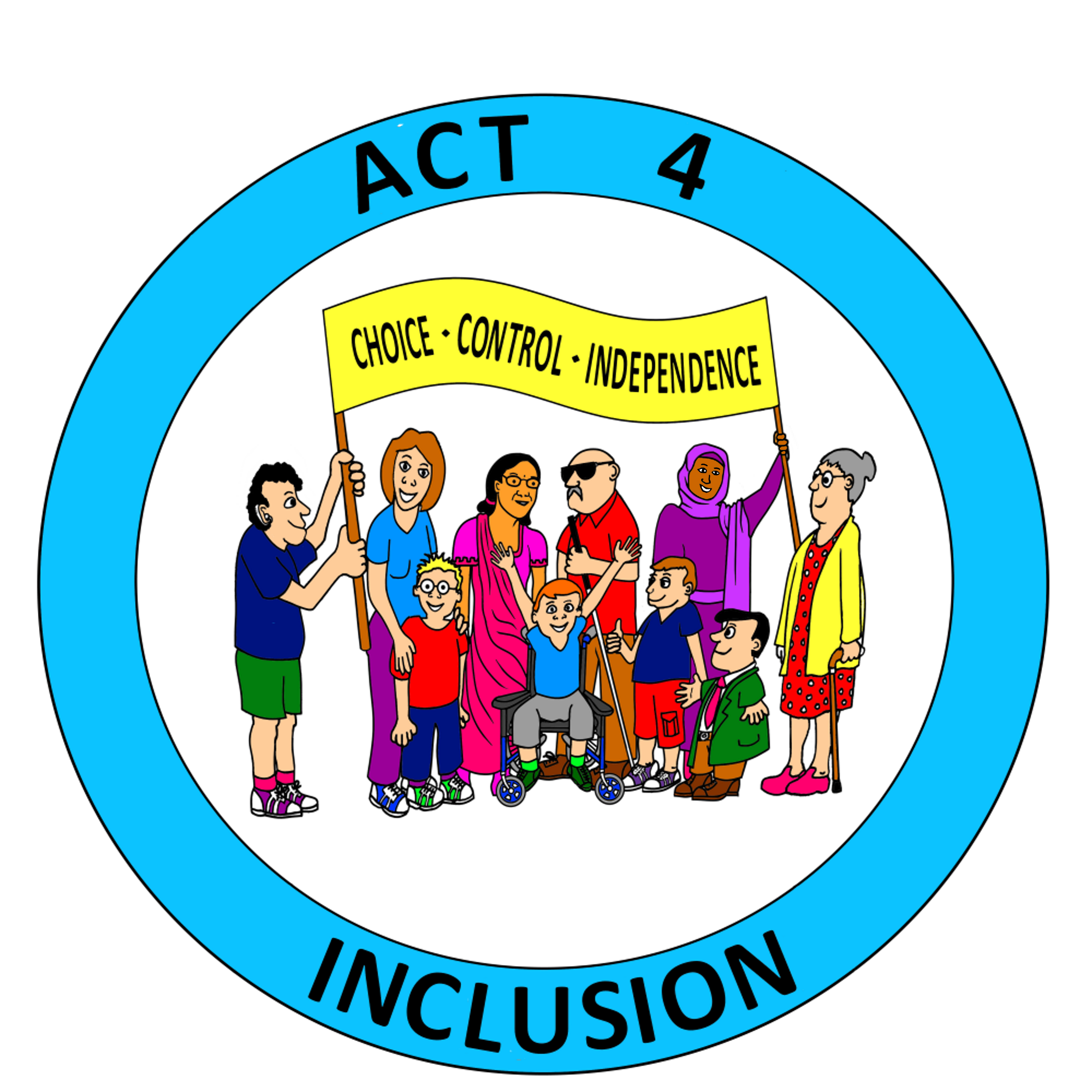Act 4 Inclusion as an organisation is still in its infancy despite emerging from the trials and tribulations of activists who came together to form Reclaim Social Care. Our journey has been one of exploration and challenge made possible by bringing together diverse groups who have different knowledge and experience; yet, at the same time, understand the current system at all levels of society is failing the majority of people. Our name and vision represent the direction of travel we wish to follow. We want to work together to transform society and turn it into one that respects diversity, challenges inequality, and provides a support system capable of delivering community-based services and Independent Living.
Our membership mainly comes from campaigners who cut their teeth either within the trade union movement or disabled people’s movement; some, of course, have been involved in both. It is not surprising therefore that Act 4 Inclusion is based upon the principles to be found within both movements. Nevertheless, it has to be recognized that neither movement has developed substantial forms of inclusive practice and diverse voices still struggle to be heard. The trade union movement in particular has its roots within the white, non-disabled, working classes and its liberal and social democratic traditions often reveal themselves in forms of paternalism and unequal power relations. Neoliberalism has impacted across all levels of society which means neither of the movements is as radical as they once were.
Since the late 1980s disabled trade unionists within both movements have sought to change cultures and instill in unions an understanding of the social approach towards disability. Unfortunately, and perhaps ironically, the passing of the Disability Discrimination Act 1995 saw the beginning of the decline of the influence of the disabled people’s movement inside unions and therefore ‘disability issues’ have either become ‘equality issues’ employing dominant ways of viewing disabled people, thereby adopting ‘problem solving’ approaches, or the involvement of disabled people has become pure tokenism. The 2000s have seen frustrating times for disabled trade unionists and disabled people as a whole. Despite being a major target in the Age of Austerity, disabled people have had to battle to be included in conferences and marches.
The TUC March on June 18, 2022, witnessed a range of unpleasant events involving disabled people. This included patronage and discriminatory practices. A disabled member of A4I was caught up in these events and that brought home to us how important it is to challenge unacceptable behaviour whilst at the same time recognizing the need to continue to make interventions into the trade unions.
The A4I’s vision is based upon developing a greater understanding of the interconnectedness of all ecological systems and that all environments impact upon everyone’s well-being. The current cost of living crisis is connected to the climate crisis and the crisis within Adult Social Care. Older and disabled people’s lives and interests are bound up within these major events as well, which is why it is essential for A4I to open up a dialogue within trade unions to promote not only our vision but also our ways of working. Within the trade unions we must promote an eco-social approach to service delivery to counteract the narrow inadequate proposal for a National Care Service. We must encourage coproduction, the development of inclusive practice based upon an understanding of intersectional issues, and challenge disablism within their cultures.
This requires A4I to develop its links with the trade union movement and to support our Trade Union Officer to bring together A4I trade union members to develop a strategy to promote our approach. The Trade Union motto has been ‘United We Stand, Divided We Fall’; currently we are divided, disabled people are being excluded and older people seen as commodities. This situation has to change and A4I can play a role in achieving this by being proactive and taking a clear message into the trade unions: ‘United We Stand’ and ‘Nothing About Us, Without Us’ must add up to the same thing.
Disabled People Against the Cuts (DPAC) want to hear from disabled people and their allies who experienced access issues in the lead up to the demonstration and on the day as they will be lodging a formal complaint to the TUC. Please support their campaign:
https://dpac.uk.net/2022/06/call-out-for-your-experiences-of-the-tuc-london-demo-on-18th-june/?fbclid=IwAR2OboG5JufV2RHztzZn53AhOHP4K3rzIcfk4_h2eZPw36c2WWgSRQEFAtU
Sandra Daniels – Facilitator
Bob Williams-Findlay – Engagement Officer
